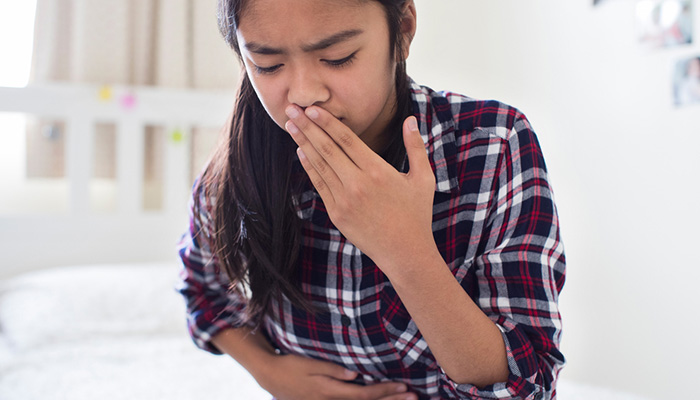Along with colds and coughs, winter brings the joy of stomach bugs. Often referred to as the
“stomach flu”, it usually starts with vomiting. Within a day, a child will start having diarrhea. As
a parent, how can you help your child at home? When should you bring them to the office?
When should you worry? Let’s try to answer some of those questions.
Most causes of “gastroenteritis” are viral. Historically, the most common cause has been
rotavirus. When I was training to be a pediatrician, my days on the wards were filled seeing
kids hospitalized for dehydration from rotavirus. In 2006, a vaccine came out to prevent kids
from getting rotavirus. It has been amazing! There has been an incredibly dramatic drop in
hospitalizations for rotavirus. There are still multiple other viruses that can cause
gastroenteritis but, fortunately, it’s much improved from a couple of decades ago. A lot of
these germs are picked up through fecal oral contact. Yep. You read that right. Improper
hand washing is a major spreader. And knowing that it can only take a few viral particles to
infect someone (and one stool can have millions of viral particles), this is not surprising.
Less commonly, bacteria can cause gastroenteritis. Bacteria can be picked up through food or
contact with known carriers of a bacteria. For example, reptiles are know to carry the bacteria
salmonella. We have seen our share of salmonella from pet turtles and lizards. This is why it’s
recommended to avoid having reptiles as pets if you have kids under five-years-old.
We usually don’t do a lot of testing in children when they have gastroenteritis. Stool studies
tend to be expensive and don’t usually change the management of your child. Exceptions to
this would be if your child is having bloody stool, if you have been traveling, camping, or if you
have a known exposure to concerning animals. Rarely do we treat a child with antibiotics for
diarrhea, even if it is bacterial. In some situations, antibiotics can actually prolong carrying the
bacteria so it is not to be prescribed lightly.
The most important thing when your child has gastroenteritis is to make sure that they stay
hydrated. As parents, we worry when our kids don’t eat. It’s human nature. But kids can go
days and days without eating. Hydration is what I worry about with my patients. If they are
vomiting, avoid trying to give them food and work on slowly getting liquids in them. Start with
just a teaspoon. If it stays down for fifteen minutes, try another teaspoon. If not, take a break
for a half an hour and try again. Children’s bodies tend to get an imbalance of electrolytes
faster and more often than adults. The younger they are, the more true that is. Try using a
solution like Pedialyte to hydrate your child. Pedialyte has the right combination of salt,
potassium, sugar, and water to replenish what your child is losing. I often will suggest
Pedialyte popsicles which can be found behind the counter at the pharmacy. It helps get fluids
in your child without giving a big load of liquid all at once. When your child has had several
hours without vomiting, slowly start going back to letting them eat. Once they have really
stopped vomiting, there is no need for a special diet even if they have diarrhea. We used to
prescribe the “BRAT” diet (bananas, rice, applesauce, and toast) for diarrhea but this has gone
by the wayside. Kids need more protein than that diet contains to heal their gut when they
have diarrhea so stick with a normal diet. That being said, it wouldn’t be a great time to feed
your child a bag of dried prunes!
When should you be worried? Signs of dehydration would be the main concern. Your young
child should have a wet diaper at least every six hours. Older kids will urinate at least a few
times a day. Is your little one making tears? Does the inside of their mouth look dry or their
eyes look sunken? Those would be signs they are getting dehydrated. If you are trying to
rehydrate them at home and they can’t even keep a teaspoon down after trying for a few
hours, we will often prescribe Zofran. Zofran helps break the cycle of vomiting. We see these
kids in the office before prescribing it to make sure there is nothing more to be concerned about
(like dehydration or appendicitis). You don’t need to rush to the ER if the only concerning
symptom your child has is bloody stool but I would recommend being seen in the office. Any
worsening abdominal pain should be checked out as well. If your child truly can’t keep
anything down and is dehydrated, they belong in the emergency room where they can get IV
fluids.
Usually, the vomiting can last a day or two and the diarrhea can last up to a week. If you are
experiencing something different than that, I would check in with your provider at South Lake.
We are happy to help navigate their illness. And, remember, wash your hands!



